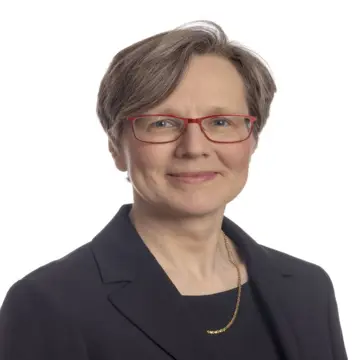
Dr Annegret Dahlmann-Noor is a consultant ophthalmologist and clinical director of the City Road division of Moorfields Eye Hospital NHS Foundation Trust and Moorfields Private Hospital. She is a member of a number of renowned medical bodies, including the Royal College of Ophthalmologists, the Royal College of Surgeons of Edinburgh, British Isles and American Paediatric Ophthalmology and Strabismus Association. Dr Dahlmann-Noor is a highly active researcher, has been extensively published in peer-reviewed medical journals and has recently won a prestigious NIHR Senior Clinical and Practitioner Research Award.
Please tell us more about your areas of expertise.
Paediatric ophthalmology, ocular motility, neuro-ophthalmology in children and young people including those with complex needs.
I offer treatments to slow worsening of short-sightedness (myopia) in children and I am principal/national co-ordinating investigator on several myopia treatment trials as well as on clinical trials of new treatments for amblyopia ("lazy eye") in children.
In my clinical work, I continue to provide service to children from birth to 16 years with any type of eye condition, except for surgical management.
Why do families come to see you?
Families often make an appointment, because they are worried about their child’s eyes or vision development, and they seek a qualified diagnosis and advice on management. They may also seek clarification on information they have received from multiple sources. What unifies all families coming to my clinic is that they want to give their children the best possible start in life.
Please tell us about your recent research projects.
My research spans a broad portfolio centred on myopia in children and young people, ranging from work in the laboratory to clinical trials to test how well new treatments work and whether they are safe to use. We are a research site for 5 clinical myopia trials, we run a study testing the effect of a new treatment on children’s eyes using advanced imaging techniques, lead studies to develop agreement (consensus) on how to implement new treatments in the UK and which outcomes should be reported in clinical trials. Together with researchers at UCL Institute of Ophthalmology, we study the processes that underlie myopia development, to develop novel treatments, and we explore whether school buildings and teaching could be modified to increase exposure to healthy light.
How do you involve children and young people in designing and running research projects?
Six times a year, on a Saturday, a group of children and young people meets at Moorfields to learn about research and to give researchers advice on how to design and run research projects, so they matter and are accessible to young people. We started the eye-YPAG (Young People’s Advisory Group for Research) in 2019, supported by Moorfields Eye Charity, and feedback from young members and researchers is overwhelming. We have won the NIHR Biomedical Research Prize for Public and Patient Involvement and Engagement, and we share best practice with other groups in the UK. Some of our young people attend the annual summit of the international Children’s Advisory Network, where they meet like-minded friends from all over the world.
-
More about Dr Annegret Dahlmann-Noor
Learn more about Dr Dahlmann-Noor's qualifications, professional memberships and the conditions she treats.
-
Refer your patients to Moorfields Private
Choose world-leading eye care for your patients.